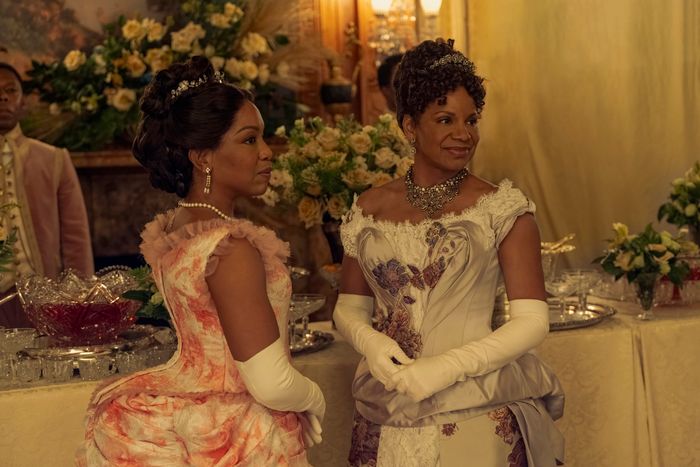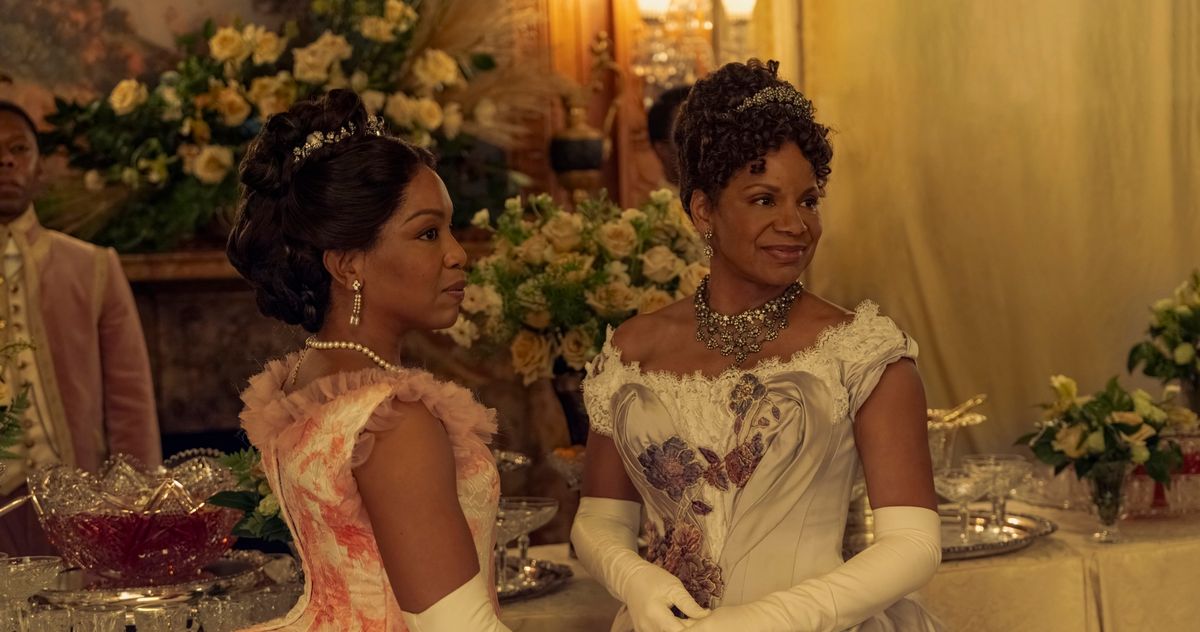
“We filmed the ball in January, so I had already been doing Gypsy for a couple of months. When I did that first line, we had to go back and do it again because I was in it. I was a little too Momma Rose.”
Photo: Karolina Wojtasik/HBO
The Gilded Age has no greater secret weapon than Audra McDonald. As the Scott family matriarch Dorothy, one of the most esteemed theater actresses of her generation was mostly confined to the sidelines through her first two seasons on the show: Secrets were kept from Dorothy, like the marriage and annulment of her daughter Peggy (Denée Benton), along with the birth and adoption of Peggy’s first child, and she rarely got a chance to take center stage. That changed with the show’s third season, which focused attention on the Scott family, bringing them to Newport and introducing them to a whole new faction of the Black elite, including the judgmental Mrs. Kirkland, played by Phylicia Rashad. McDonald and Rashad went after each other with minor snipes all season, but it came to a head in the finale, when Mrs. Kirkland walked into a dress shop and insulted Dorothy’s daughter to her face. Finally, Dorothy snapped, telling her foe that she has acted “without grace, manners, and impunity,” which, while delivered with McDonald’s customary poise, is still basically the 19th-century equivalent of a bitch slap.
“Knowing that it was going to be a very slow boil for Dorothy, I had to navigate how much I would allow her to show how she was feeling, because she was trying to keep it all together,” McDonald says. “I knew that Dorothy was going to get to a boiling point, and she was finally going to blow. I made a conscious effort to keep it in check but protect my daughter.”
Denée Benton said that for her, this season felt like a culmination of a lot of work for a lot of people. Did you get that sense?
I think so. In the first season, Peggy’s story is a mystery. Some sort of break has happened within her little family, and it takes until the end of that first season to get any idea of it. The whole world Peggy comes from is very small compared to what else is going on in the show. I love that, over the course of the three seasons, we’ve been able to open up the aperture to see how the Black elite functions as a society. Peggy is the glue that glues the two sides of the story together, but I have just loved widening the world to the point where finally, in this season, our family is in Agnes and Ada’s house. The world is mixing and getting messy as the world is and was.
Obviously, you’ve worked with Christine Baranski a lot before; how was it to work with her here?
It was so great to finally get a scene with her, but it was a little odd just because we worked together for years and years on The Good Fight. Every other scene I did on The Good Fight was with Christine. I was so used to being on-camera with her as Liz and Diane that the first couple of hours when we were Agnes and Dorothy, I was a little thrown. During the second season, I begged Julian Fellowes, “Please give me a scene with Christine. I don’t know how you’re going to do it, but please, please, please.” In between scenes, we were just our normal selves — running our mouths and chitchatting and talking about this and singing that, like we always do. It took a minute to get used to who we were as characters. And now I want more. I’m hungry.
Your biggest scene this season came in the finale, where you dressed down Phylicia Rashad as Mrs. Kirkland, but you’ve been mad at her all season. How did you think about building to that point?
Talk about a slow boil! Mrs. Kirkland is sort of a mixture of Bertha, Agnes, and even Mrs. Astor in terms of what she deems right and acceptable. Meanwhile, Dorothy, we learned this season, went against her parents’ wishes in marrying Arthur. I think it’s wonderful that we start to hear more of their backstory, with Arthur being a former slave and how Dorothy had to bring her family around to loving and accepting him. So she immediately triggers something in Dorothy. Dorothy’s only child is Peggy, and they’ve already experienced the loss of what would have been their grandson. So Dorothy is always in protection mama-bear mode. The Kirklands have this yin and yang: Wow, look at this wonderful doctor who seems to really have an interest in Peggy and would be an incredible catch. Then there’s the yang of this awful, vindictive, snotty woman Mrs. Kirkland, who thinks that we are less than for our color.
During the monologue, you get the sense that Dorothy doesn’t know what she is going to say next.
She didn’t. It just flew out. She’s been sitting on it since they met. The very first episodes of the season, it was like, Is Peggy gonna die? Then she’s safe, but, Oh, who’s this cute guy? Let’s go to Newport. Then you know someone is telling me that my husband, my child, and I are not worthy. So she does get to the end of her rope. And it’s not like Dorothy marched over to Mrs. Kirkland’s house to have this conversation. This conversation may never have happened except for the fact that Mrs. Kirkland happened to see Dorothy trying on a dress.
Audra McDonald could never choose words as beautifully and as pointedly as Dorothy does in that moment. Audra McDonald, when she gets angry and in the moment, most likely just starts crying and screaming. But not Dorothy Scott. Sonja Warfield and Julian were very smart to put it in a public place, so it couldn’t get too big even for the time.
Obviously, you’ve known Phylicia Rashad for a long time, having starred in A Raisin in the Sun together. What was it like to go at her?
It was hard. It’s Phylicia! Phylicia is my Phylicia. I love that woman so much, and I’ve known her for so long and I admired her before I even met her. They say don’t meet your heroes, but I met my hero, and she turned out to be one of my favorite people on the planet. I’ve learned so much from working with her, a mentor at times, a friend, a sister-friend. So it was very, very hard. I was having a hard time with my lines that day, and I think it was because I had to go at Phylicia in a vicious way, and that was hard. For some reason, the way my body dealt with it is that the lines just kept going out of my head.
One of the nice things for Dorothy this year was that, after being out of the loop in earlier seasons regarding Peggy’s traumas, she got to protect her this year. How did that feel?
Wonderful. I’m the luckiest actor in the world, because my partners are amazing. I’ve got John Douglas Thompson, Phylicia, and then of course Denée. We do feel like a little family; we never stop gabbing once the camera is off. I hope that Denée thinks of me as someone she can come to and talk about business things or being a Black woman in this business. I hope that I feel like at least an auntie to Denée. So to be able to play someone whose main objective in life is to protect her and help her thrive is something that I’m hoping to do in real life anyway. It was nice to be given the opportunity to do that and for Dorothy to have the tools and knowledge to protect Peggy this season. Dorothy, for the most part, was not so caught on her heels this season as she has been in other seasons.
She’s more of a doer.
I like that given all of that, Dorothy says, “Hell, no, we are going to this ball.”
How was the ball to film?
It was great to see Black people in this beautiful ball. It was beautiful to be able to call on Dorothy’s strength and have Dorothy pour that strength into Peggy, saying, “We will be here. We will have a good time. Don’t let these people determine who you are.” We filmed most of the stuff in August and filmed the ball in January, so I had already been doing Gypsy for a couple of months. When I did that first line, we had to go back and do it again because I was in it. I was a little too Momma Rose. I said, “Wait a minute, wait a minute. That was Rose. That wasn’t Dorothy. I gotta tone it down a little bit.”
Did Rose and Dorothy bleed into each other at all? They’re both protective mothers.
Yes and no. I mean, they’re both Black women. Dorothy has more opportunity, in a weird way. Comparatively speaking to Rose, she lived a life of luxury. She has a husband who she does love very much. She’s protected, taken care of, and doing what she can to take care of her child. Rose has to be scrappy. She is basically on her own. I don’t think Dorothy and Rose would have run in the same circles, and some of the people in Dorothy’s circle would have looked down on Rose and the way that Rose chose to mother her children.
You have scenes in Newport this season with Denée, Phylicia, John, Jordan Donica, and Brian Stokes Mitchell — all of whom are extremely accomplished theater actors. What is it like on set?
Perhaps people would think it’s, Oh, they all speak with perfect diction and talk about “the last time I was doing Shakespeare.” But the theater community is a small community, and the Black theater community is extremely small. We all know and support each other, so it was just a grand old time. We’d shut up long enough to do the scenes and then go back to having a great time chatting and laughing. I remember a lot of laughter on the set. And then somebody would say, “Okay, shut up. Let’s do the scene,” and we’d focus. We all speak the same language in terms of how one works. Get in there, do the work, stay focused, be there for everybody else’s coverage, give them everything that they need for their coverage that they gave you for your coverage, etc. Then they say “cut,” and we’re just chitchatting.
Do you have any hopes for Dorothy in the fourth season?
I would like for Dorothy to follow Peggy’s lead and move in the world in a more independent way, as many women were trying to do at that time. And then, I also want to see Dorothy be able to hold her grandchild and be a grandmother at some point. That’s the thing that breaks Dorothy’s heart more than anything, is to know that she was a grandmother and never met that child, never got to hold it and love it and take care of it and take care of Peggy as her daughter. I want that for Dorothy desperately.
Related

